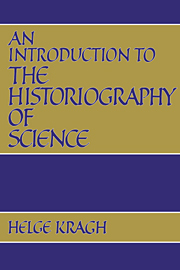Book contents
- Frontmatter
- Contents
- Preface
- 1 Aspects of the development of the history of science
- 2 History of science
- 3 Objectives and justification
- 4 Elements of theory of history
- 5 Objectivity in history
- 6 Explanations
- 7 Hypothetical history
- 8 Structure and organization
- 9 Anachronical and diachronical history of science
- 10 Ideology and myths in the history of science
- 11 Sources
- 12 Evaluation of source materials
- 13 Scientists' histories
- 14 Experimental history of science
- 15 The biographical approach
- 16 Prosopography
- 17 Scientometric historiography
- Notes
- Bibliography
- Index
9 - Anachronical and diachronical history of science
Published online by Cambridge University Press: 30 November 2009
- Frontmatter
- Contents
- Preface
- 1 Aspects of the development of the history of science
- 2 History of science
- 3 Objectives and justification
- 4 Elements of theory of history
- 5 Objectivity in history
- 6 Explanations
- 7 Hypothetical history
- 8 Structure and organization
- 9 Anachronical and diachronical history of science
- 10 Ideology and myths in the history of science
- 11 Sources
- 12 Evaluation of source materials
- 13 Scientists' histories
- 14 Experimental history of science
- 15 The biographical approach
- 16 Prosopography
- 17 Scientometric historiography
- Notes
- Bibliography
- Index
Summary
According to the anachronical view, the science of the past ought to be studied in the light of the knowledge that we have today, and with a view to understanding this later development, especially how it leads up to the present. It is considered legitimate, if not necessary, that the historian should ‘intervene’ in the past with the knowledge that he possesses by virtue of his placement later in time. Anachronical historiography, in the sense being used here, involves a certain type of anachronism; but it is not necessarily anachronistic in the usual, derogatory sense.
Today, anachronical history of science is rarely a conscious historiographical strategy. On the contrary, there is broad agreement about praising a non-anachronical ideal. Even so, in practice, anachronical history of science is widespread and difficult to avoid. The doctrine is connected to the presentist view of history which may be seen as a theoretical justification of anachronical historiography. Furthermore, this perspective is legitimate from the points of view that regard the goal of history of science as primarily bound up with the present situation (cf. Chapter 3). If one believes that it is the task of the historian of science to understand the technical contents of older science and to pass this understanding on to the scientists of today, then a way of presentation that is anachronical in tendency will be natural. A text will then be taken to have been understood if its true contents, in the current sense, can be represented with modern formalism and using modern knowledge.
Several studies of the history of thermodynamics have followed this prescription.
- Type
- Chapter
- Information
- An Introduction to the Historiography of Science , pp. 89 - 107Publisher: Cambridge University PressPrint publication year: 1987



